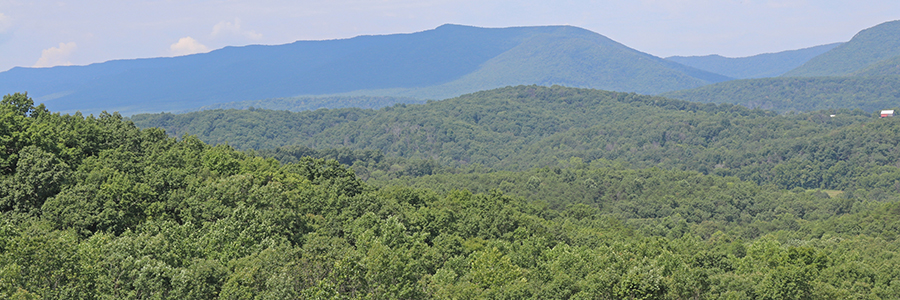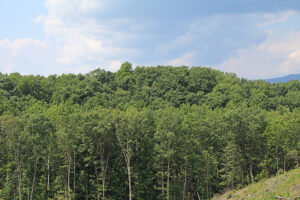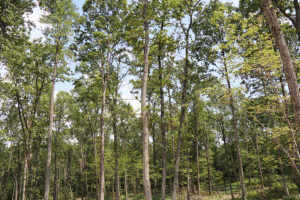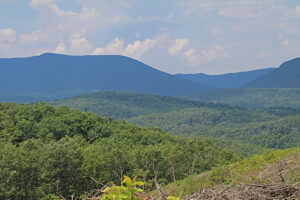
Overview
Devil’s Backbone State Forest covers 705.5 acres in Shenandoah County. Management focuses on demonstration of scientific forest management, applied forest research, development of diverse wildlife habitat, watershed protection, forest management to develop diverse timber stands that support biological diversity, and passive outdoor recreation.
The ridge on the top of the state forest is approximately 7,000 feet in length and 180 feet wide. The terrain in this stand is quite rough due to the 35% to 70% slopes, rock outcrops, and heavy underbrush. The top of the mountain is narrow in most places; however, broad flats occur periodically along its summit. Several intermittent and perennial streams exist on the property.
At a Glance
Access Status: Open to the Public
Hours: Open daily from dawn until dusk
Physical Address:
Latitude/Longitude:
39° 3′ 1.3″, -78° 26′ 24.2″
Parking/Access: Access from Brocks Lane off Route 621
Parking area on Brocks Lane
Brocks Lane past the parking area is not accessible for public use.
Restroom Facilities: None
Visitors are asked to adopt a “leave-no-trace” ethic when visiting the forest, as there are no restrooms or trash cans on the forest itself.
Other Facilities: None
Seasonal Closures: None
VDOF recommends that all forest visitors wear blaze orange or pink during hunting seasons.
By conveyance of title, John L. Hoffman and Bernice I. Hoffman deeded by gift 537.048 acres to the Virginia Department of Forestry between 1995 and 2013. 85.736 acres was purchased from the Hoffman Estate in 2016. Mrs. Judith Dyke by conveyance of title gifted 44.171 acres in 2002. An additional 26.627 acres was acquired through quitclaim deed in 2008.
Management objectives for the Devil’s Backbone State Forest have been developed to achieve multiple-use benefits, including watershed protection, forest management, wildlife habitat, forest recreation, education and research activities.
Upland hardwood silviculture is of primary importance on the forest. Intensive forest management on the existing loblolly stands is leading to their conversion to shortleaf pine or upland hardwoods as they reach rotation. Prescribed fire is used when appropriate to improve wildlife habitat. Research sites and demonstration areas may be developed in the future.
Recreational uses of the Devil’s Backbone State Forest include hiking, biking, limited hunting, and wildlife watching. Hiking is the most common recreational use with many visitors.
Visitors are asked to adopt a “leave-no-trace” ethic when visiting the forest, as there are no restrooms or trash cans on the forest itself.
ATV/ORV use, camping, and swimming are prohibited on all State Forests.
A State Forest Use Permit* is required for individuals aged 16 and older to hunt, fish, trap, horseback ride, or mountain bike on state forest lands. The permit can be purchased online or where hunting licenses are sold.
Trails and Roads
- 2 miles of gated forest roads (no vehicles)
- No driving past forest gates.
- No developed trails on the forest. Future plans include developing a hiking trail to the summit.
Hiking
Hiking is permitted on all forest roads.
Mountain Biking
Mountain biking is permitted on all forest roads.
Horseback Riding
Horseback riding is limited to forest roads.
State law requires that visitors carry a copy of a negative Coggins test report with each horse on state lands.
Fishing and Boating
None
Hunting and Trapping
Archery and black powder hunting are permitted with a valid State Forest Use Permit and valid hunting license in accordance with state regulations. Note that some regulations may be different than on private land, so check Virginia Department of Wildlife Resources Hunting Regulations for specific state forest details.
Other Recreational Opportunities
Other passive recreational opportunities, such as wildlife watching and nature photography, are available.
- Self-learning opportunities are available.
Explore tree and wildlife identification, study rock formations, or simply observe nature. The forest demonstrates forest management, harvesting techniques, and best management practices to landowners, loggers, and industry professionals.
Local schools can use the state forest for educational purposes.
For more information or questions, e-mail us or use our contact form.
State Forest Main Office
Located at Cumberland State Forest
751 Oak Hill Road, Cumberland, VA 23040-2511
E-mail | (804) 492-4121



